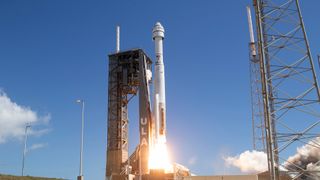
A United Launch Alliance Atlas V rocket carrying Boeing’s Starliner Crew Flight Test (CFT) for NASA’s Commercial Crew Program lifts off from Space Launch Complex-41 on June 5, 2024.
(Image credit: United Launch Alliance)
SpaceX bigwigs celebrated the arrival of a new American capsule on the human-spaceflight scene today (June 5).
That spacecraft is Boeing’s Starliner, which is carrying NASA astronauts Butch Wilmore and Suni Williams toward the International Space Station (ISS) after launching this morning atop a United Launch Alliance (ULA) Atlas V rocket.
“Congratulations on a successful launch!” SpaceX founder and CEO Elon Musk said via X today.
SpaceX’s president and chief operating officer, Gwynne Shotwell, shared similar, slightly more verbose sentiments in an X post of her own: “Congratulations to @NASA, @BoeingSpace and @ULAlaunch on this morning’s launch to the @space_station, and Godspeed to Butch, Suni and Starliner on your flight!”
Related: Boeing Starliner 1st astronaut flight: Live updates
Congratulations on a successful launch! https://t.co/DiwBo6LheWJune 5, 2024
Starliner is scheduled to reach the ISS tomorrow (June 6) around 12:15 p.m. EDT (1615 GMT). You can watch that milestone here on Space.com, courtesy of NASA.
The capsule, Wilmore and Williams will remain at the orbiting lab for about a week, then head back home to Earth to wrap up the mission, which is known as Crew Flight Test (CFT). If all goes well, Starliner will be certified to fly six-month astronaut missions to and from the ISS for NASA — something SpaceX already does.
Breaking space news, the latest updates on rocket launches, skywatching events and more!
Boeing and SpaceX both got multibillion-dollar contracts from NASA’s Commercial Crew Program back in 2014 to provide this astronaut-ferrying service. SpaceX launched its version of CFT, known as Demo-2, in May 2020 and is now in the middle of its eighth operational, long-duration crewed mission for the agency.
Starliner’s road has been far bumpier. The capsule failed to meet up with the ISS on its first uncrewed test flight back in December 2019, for example. And issues with the capsule’s parachute system and wiring (much of which was wrapped in flammable tape) caused further delays.
It’s easy to frame the SpaceX-Boeing situation as a race — one that Musk’s company is winning handily. But NASA doesn’t see things that way, according to agency chief Bill Nelson.
“When we expand our fleet of spacecraft, what we’re doing is expanding our reach to the stars,” Nelson said in a postlaunch news conference today. “So this is a special moment. It’s another one of those great markers in history.”
Boeing representatives also downplayed the competition angle, sending positive vibes back in SpaceX’s direction.
“We don’t see it as a competition,” Mark Nappi, vice president and program manager of Boeing’s Commercial Crew Program, said during today’s news conference. “I sit on my front porch and I watch every SpaceX mission, and I root for them, too. This is something that’s great for the entire country.”
Join our Space Forums to keep talking space on the latest missions, night sky and more! And if you have a news tip, correction or comment, let us know at: [email protected].
Michael Wall is a Senior Space Writer with Space.com and joined the team in 2010. He primarily covers exoplanets, spaceflight and military space, but has been known to dabble in the space art beat. His book about the search for alien life, “Out There,” was published on Nov. 13, 2018. Before becoming a science writer, Michael worked as a herpetologist and wildlife biologist. He has a Ph.D. in evolutionary biology from the University of Sydney, Australia, a bachelor’s degree from the University of Arizona, and a graduate certificate in science writing from the University of California, Santa Cruz. To find out what his latest project is, you can follow Michael on Twitter.
>>> Read full article>>>
Copyright for syndicated content belongs to the linked Source : Space.com – https://www.space.com/spacex-elon-musk-congratulates-boeing-ula-starliner-launch










